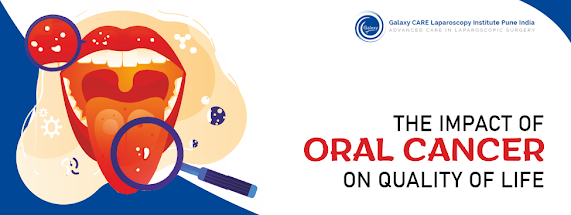THE IMPACT OF ORAL CANCER ON QUALITY OF LIFE: SPEECH, EATING, AND APPEARANCE
Oral cancer is a formidable adversary that not only threatens physical health but also takes a significant toll on the quality of life of those affected. It's a disease that affects various aspects of daily living, including speech, eating habits, and appearance. Understanding these impacts is crucial not only for patients but also for caregivers, healthcare providers, and the broader community.
Speech Impairment:
One of the most noticeable effects of oral cancer is its impact on speech. Lesions or tumors in the mouth, throat, or tongue can hinder the ability to articulate clearly, leading to difficulties in communication. For many individuals, this can be emotionally distressing, affecting their confidence and social interactions. Simple tasks like speaking on the phone, ordering food at a restaurant, or participating in conversations become daunting challenges.
The treatment modalities for oral cancer, such as surgery, radiation therapy, and chemotherapy, can exacerbate speech difficulties. Swelling, scarring, or changes in the oral cavity's structure may occur post-treatment, further impeding speech clarity. Speech therapy is often recommended to help patients regain or improve their communication skills, but it requires time, effort, and patience.
Eating Challenges:
Oral cancer and its treatments often disrupt eating habits, leading to significant challenges in maintaining proper nutrition and hydration. Tumors or surgical procedures may affect the ability to chew, swallow, or taste food. Some patients experience pain or discomfort while eating, leading to a decreased appetite or aversion to certain foods.
The consequences of these eating difficulties can be severe, potentially resulting in malnutrition, weight loss, and a weakened immune system. Moreover, the enjoyment and social aspect of sharing meals with loved ones may diminish, impacting the overall quality of life. Dietary counseling, nutritional supplements, and modifications in food texture can help alleviate some of these challenges, but dietary adjustments may still be necessary.
Appearance Changes:
The visible effects of oral cancer can significantly impact a person's self-image and self-esteem. Surgery to remove tumors or reconstructive procedures may alter facial features, such as the lips, jaw, or tongue. Scars, disfigurement, or the loss of teeth can be emotionally distressing and may lead to feelings of self-consciousness or social withdrawal.
Furthermore, the side effects of cancer treatments, such as hair loss, skin changes, or weight fluctuations, can further contribute to changes in appearance. Coping with these changes requires psychological support, counseling, and perhaps interventions like cosmetic procedures or prosthetics to help patients regain confidence in their appearance.
Conclusion:
The impact of oral cancer on quality of life extends far beyond physical health. It affects fundamental aspects of daily living, including communication, eating habits, and self-perception. Recognizing these challenges is crucial for providing comprehensive care and support to individuals affected by oral cancer.
In addition to medical interventions, addressing the psychosocial needs of patients is paramount. Support groups, counseling services, and rehabilitation programs play a vital role in helping patients cope with the emotional and social ramifications of their condition. By fostering a supportive environment and raising awareness about the multifaceted impacts of oral cancer, we can strive to improve the overall well-being and quality of life of those affected by this disease.



Comments
Post a Comment